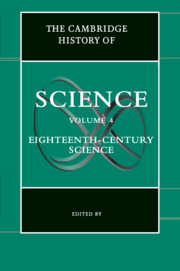Book contents
- Frontmatter
- 1 Introduction
- Part I Science and Society
- Part II Disciplines
- 10 Classifying the Sciences
- 11 Philosophy of Science
- 12 Ideas of Nature: Natural Philosophy
- 13 Mathematics
- 14 Astronomy and Cosmology
- 15 Mechanics and Experimental Physics
- 16 Chemistry
- 17 The Life Sciences
- 18 The Earth Sciences
- 19 The Human Sciences
- 20 The Medical Sciences
- 21 Marginalized Practices
- Part III Special Themes
- Part IV Non-Western Traditions
- Part V Ramifications and Impacts
- Index
- References
19 - The Human Sciences
from Part II - Disciplines
Published online by Cambridge University Press: 28 March 2008
- Frontmatter
- 1 Introduction
- Part I Science and Society
- Part II Disciplines
- 10 Classifying the Sciences
- 11 Philosophy of Science
- 12 Ideas of Nature: Natural Philosophy
- 13 Mathematics
- 14 Astronomy and Cosmology
- 15 Mechanics and Experimental Physics
- 16 Chemistry
- 17 The Life Sciences
- 18 The Earth Sciences
- 19 The Human Sciences
- 20 The Medical Sciences
- 21 Marginalized Practices
- Part III Special Themes
- Part IV Non-Western Traditions
- Part V Ramifications and Impacts
- Index
- References
Summary
Historians have long seen the search for a viable “science of man [sic]” as a central feature of eighteenth-century intellectual life. David Hume’s (1711–1776) desire to be “the Newton of the moral Sciences” and his insistence in 1740 that “’tis at least worthwhile to try if the Sciences of man will not admit of the same accuracy which several parts of natural philosophy are found susceptible of” have been taken to represent the views of a huge number of intellectuals throughout the century and across all nations of Europe and North America. Moreover, the centrality of the human sciences to the Enlightenment project is acknowledged not only by those sympathetic to the goals of that project and fundamentally optimistic about its liberating consequences but also by those who have found the goals misdirected and the consequences fundamentally destructive.
The issue of how to portray the relationships between such twentieth-century professional disciplines as anthropology, economics, geography, history, linguistics, psychology, or sociology and various eighteenth-century attempts to establish human sciences is both extremely complex and a matter of intense debate. Eighteenth-century authors and readers often thought in terms of categories that differ from those in use today. Thus, for example, the phrases “the natural history of man” and “philosophical history” were frequently used to include many topics now included in anthropology, linguistics, and sociology, along with some that now belong to political science and aesthetics. At the same time, “anthropology” was used in German speaking regions to cover physiology as well as topics from the first three twentieth-century disciplines.
- Type
- Chapter
- Information
- The Cambridge History of Science , pp. 436 - 462Publisher: Cambridge University PressPrint publication year: 2003
References
- 1
- Cited by



